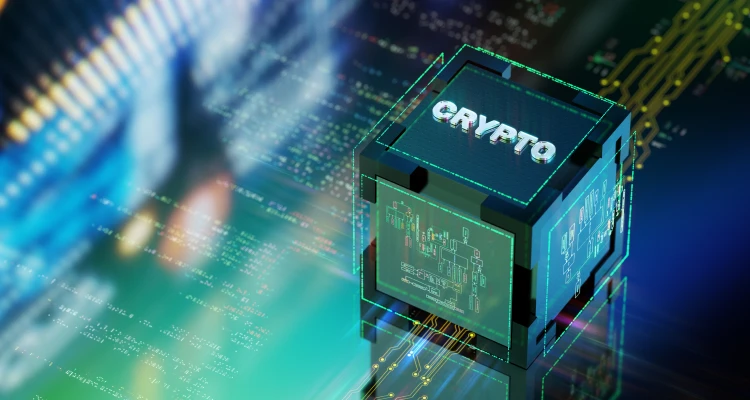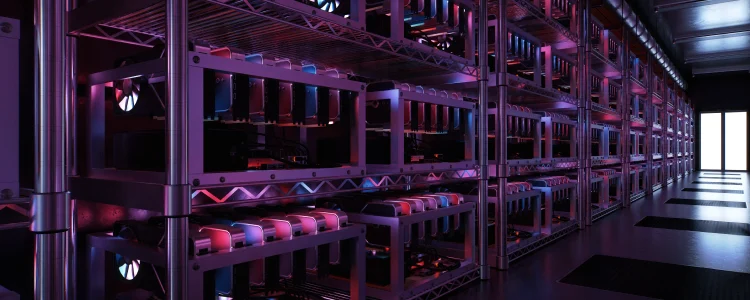How Does Crypto Cloud Mining Work?

As businesses start to dive deeper into blockchain technologies (and increase the adoption of these technologies, too), there is a need for an accessible, cost-effective, and scalable solution to the mining process. Which is exactly why cloud mining has become a popular option.
At its core, cloud mining allows companies to rent processing power from dedicated server providers, using their powerful infrastructure to create, host, and run cloud miners. This helps democratize access to mining efforts without needing to maintain equipment.
ServerMania has been helping organizations and businesses set up, host, and manage servers for over twenty years. We offer solutions for more than just blockchain node hosting; we can even set up your own cloud mining operation, no matter how big or small. Plus, we offer servers hosted in data centers that use sustainable and renewable energy, giving you peace of mind over the environmental impact.
In this article, we’ll cover the basics of Cryptocurrency mining, how cloud mining works, what to look for in a cloud mining server, and some of the pros and cons of cloud mining.
See Also: Blockchain Server Hosting
Basics of Cryptocurrency Mining
Cryptocurrency mining is a process that involves performing complex mathematical equations to validate transactions and secure a blockchain network. It’s carried out via specialized mining hardware that offers significant computing power to solve cryptographic puzzles. The two primary objectives of crypto mining are:
- Transaction Validation – Mining rigs verify the legitimacy of transactions to prevent issues like double-spending, where a user could attempt to spend the same cryptocurrency twice.
- New Currency Issuance – Crypto mining also issues new coins to be put into circulation, creating decentralized financial systems that don’t rely on a central bank.
Miners compete to solve these cryptographic puzzles, and the first miner to do so gets the right to add a new block of transactions to the blockchain. The miner is then rewarded with the newly minted cryptocurrency and transaction fees.
Read More: How to Set up, Buy and Trade Bitcoin
What Does the Blockchain Do, Anyway?
Mining operations are only one part of the overall mining process. However, the technology that it’s based upon operates differently. Blockchain technology is fundamentally a decentralized ledger that records all transactions across a network of computers. Here’s how it plays into transaction validation and network security:
- Decentralization – Unlike a traditional ledger, blockchain is not hosted or controlled by a single entity. Instead, it’s distributed across the entire network, ensuring that no single point of failure can affect its integrity.
- Immutability – Once a transaction is recorded on a blockchain, it cannot be deleted or modified by any party. This immutability is secured through cryptographic hash functions that link each block to its predecessor in a time-stamped chain.
- Consensus Mechanisms – Blockchain uses consensus models like Proof of Work (PoW) or Proof of Stake (PoS) to agree on the validity of transactions.
The security of a blockchain is maintained through its distributed nature and cryptographic algorithms. Blockchain technology minimizes the risk of fraudulent activities by requiring that most nodes (computers on the network) agree on the validity of transactions and blocks. The effort and computational power needed to override the consensus of a blockchain network make it secure against attacks, such as the 51% attack, where an attacker would need to control the majority of the hashing power to manipulate the blockchain.

How Cloud Mining Works
Cloud mining is a method that allows individuals and companies to participate in mining without needing to directly own or manage physical mining hardware. This approach dramatically reduces the barrier to entry, so they can start mining faster and without requiring deep technical knowledge. Here’s an example of how to start cloud mining:
- Research and Select a Cloud Mining Provider – The first step includes thorough research to find cloud mining service providers. Look for providers with a good reputation and fair, transparent contract terms to avoid cloud mining scams. Cloud mining providers like ServerMania offer stable, secure hardware and managed services for your business.
- Choose a Mining Plan – Once you’ve picked your cloud mining platform, the next step is choosing a plan. These plans can vary based on factors like the amount of hash power you want or whether you want to mine Bitcoin or other currencies. The plan you choose will determine your share of the mining output based on the hash power you purchase.
- One important thing to consider is how your provider handles your mining operation. Some cloud mining platforms may automatically group you up within a mining pool consisting of other users. Be sure to look into how the mining pool is structured and whether the fees or reward structure affects your potential earnings.
- Start Cloud Mining – Once you’ve signed any contracts or agreements, it’s time to put that mining power to use. Since you’re paired up with a cloud mining platform, they handle and manage all of the hardware setup and management within their own mining farm, so you can sit back and relax.
- Receive Your Mining Rewards – Based on the mining operation’s success and your purchased hash power, you’ll eventually get paid your cryptocurrency rewards. The amount and frequency of your mining operations is usually based on the contract you signed.
See Also: Bitcoin Dedicated Server Hosting
The Different Kinds of Cloud Mining Services
There are generally three different types of cloud mining, offering different ways to manage your mining operation based on your investment and how involved you want to be with your cloud mining platform.
- Hosted Mining – This type typically involves leasing equipment from mining farms or cloud mining platforms. With hosted mining, you have more control over the hardware setup and, potentially, the mining software. However, it also means you’ll need more technical knowledge to operate and manage it.
- Virtual Hosted Mining – Instead of owning or leasing mining hardware, some cloud mining platforms can create a virtual private server to run your mining software. This method offers more flexibility with the software you want to use, but it still requires some technical knowledge to set up and manage your mining equipment.
- Leased Hashing Power – This is the most common option for everyday people who aren’t interested in mining equipment or virtual servers. Renting hash power is the most user-friendly and accessible way to start cloud mining, but it isn’t always the most cost-effective way to generate revenue.
Cloud mining simplifies the mining process by removing the need to deal with complex hardware and software setups. However, it’s important to conduct thorough research and consider the potential risks, especially regarding the reliability of the cloud mining provider and the terms of the mining contract.

The Role of Server Infrastructure in Cloud Mining
Server infrastructure plays a critical role in the efficiency and effectiveness of cloud mining services. Understanding the technical requirements is essential for companies interested in blockchain technology and the servers capable of managing it.
Cloud mining relies heavily on powerful physical hardware to handle the increasing mining difficulty that comes with mining. An efficient cloud mining service requires high-performance servers that can run complex cryptographic calculations quickly and continuously. The primary function of these servers is to ensure uninterrupted mining operations, as any downtime can lead to a loss of revenue and potential mining opportunities.
Servers in cloud mining are tasked with processing large volumes of data and executing blockchain transactions. These processes require immense processing power and efficient cooling systems to maintain optimal performance and prevent overheating, which can reduce the lifespan of hardware components and can have steep energy requirements.

Types of Servers and Hardware Used in Cloud Mining Operations
Cloud mining operations utilize a variety of servers and hardware configurations tailored to the specific needs of different cryptocurrencies:
- ASIC Servers – Application-Specific Integrated Circuit (ASIC) servers are designed specifically for mining cryptocurrencies. They offer high processing power and are optimized for performing the hashing functions required in Bitcoin mining. These servers are known for their efficiency but are less versatile as they are designed to mine specific cryptocurrencies.
- GPU Servers – Graphics Processing Unit (GPU) servers are more versatile than ASICs and can mine multiple types of cryptocurrencies. They are particularly useful for coins that require a different computational approach, offering a balance between performance and power consumption.
- FPGA Servers – Field-Programmable Gate Array (FPGA) servers provide a middle ground between ASICs and GPUs. These servers are customizable and can be programmed to suit specific mining tasks, which can be changed as needed to adapt to new mining requirements.

Risks and Benefits of Cloud Mining
Cloud mining presents an attractive option for companies looking to engage in cryptocurrency mining without the overhead of managing physical hardware. However, like any investment, it comes with its own set of risks and benefits.
First off, let’s cover the good stuff:
Scalability
One of the most significant advantages of cloud mining is scalability. Companies can start small, with minimal investment, and increase their mining capacity as they grow comfortable with the process or as their budget allows. This flexibility is not typically feasible with traditional mining, which requires substantial upfront hardware expenditures.
No Upfront Hardware Investment
Cloud mining eliminates the need for large initial investments in expensive mining hardware such as ASICs or GPUs. This reduces the entry barrier for smaller companies and spares them the ongoing maintenance and upgrade costs associated with physical mining rigs.
Accessibility
Cloud mining services make cryptocurrency mining accessible to a broader range of businesses, especially those without the technical expertise or physical space to set up and maintain mining equipment. This democratization can help diversify and expand the blockchain ecosystem.
Reduced Energy Concerns
Since the cloud mining providers manage the hardware, companies do not have to deal with the high energy costs directly associated with running mining equipment, which can also help reduce the environmental impact of their operations.
And the bad:
Risk of Scams and Fraud
The cloud mining space, unfortunately, includes providers who may not be transparent or honest about their operations. The risk of fraud is significant, with some cloud mining services turning out to be Ponzi schemes or failing to provide the promised returns. Companies must conduct thorough due diligence and choose providers with established reputations and verifiable track records.
Lack of Control and Dependency
When opting for cloud mining, companies depend heavily on the cloud provider’s ability to manage and maintain their mining operations effectively. This can sometimes lead to issues with reliability and availability, affecting potential mining outputs.
Fixed Contracts
Many cloud mining contracts are for fixed terms, which can limit flexibility. If the price of the mined cryptocurrency falls or if mining becomes unprofitable due to increased difficulty or other factors, companies might still be locked into paying for a service that no longer meets their needs or expectations.
Hidden Fees and Lower Returns
Some cloud mining contracts come with hidden fees for electricity and maintenance, significantly eating into the profits. Moreover, because cloud mining profits must be shared with the service provider, the actual returns can be lower than those obtained from direct mining operations.
Environmental Impact
While cloud mining reduces direct energy consumption for companies, the overall environmental impact remains significant. The energy-intensive nature of mining means that unless providers use renewable energy sources, cloud mining can still contribute to high carbon emissions.
Wrapping Up
The world of cryptocurrency and cloud mining is still fairly new, with surges of popularity thanks to new coins, projects, and the lucrative option of bitcoin mining. Getting started with cloud mining can be a great way for companies to contribute to these blockchain networks, or create and host their own.
Cloud mining offers businesses an affordable and accessible way to participate in decentralized financial systems, offloading many of the overhead costs and responsibilities of managing a server.
Interested in starting your own cloud mining company, or do you want to start mining for your preferred cryptocurrency? ServerMania can cover your hosting needs, offering one of the best cloud mining platforms without forking over a huge investment. Check out our dedicated servers and start bitcoin mining today!
Was this page helpful?

